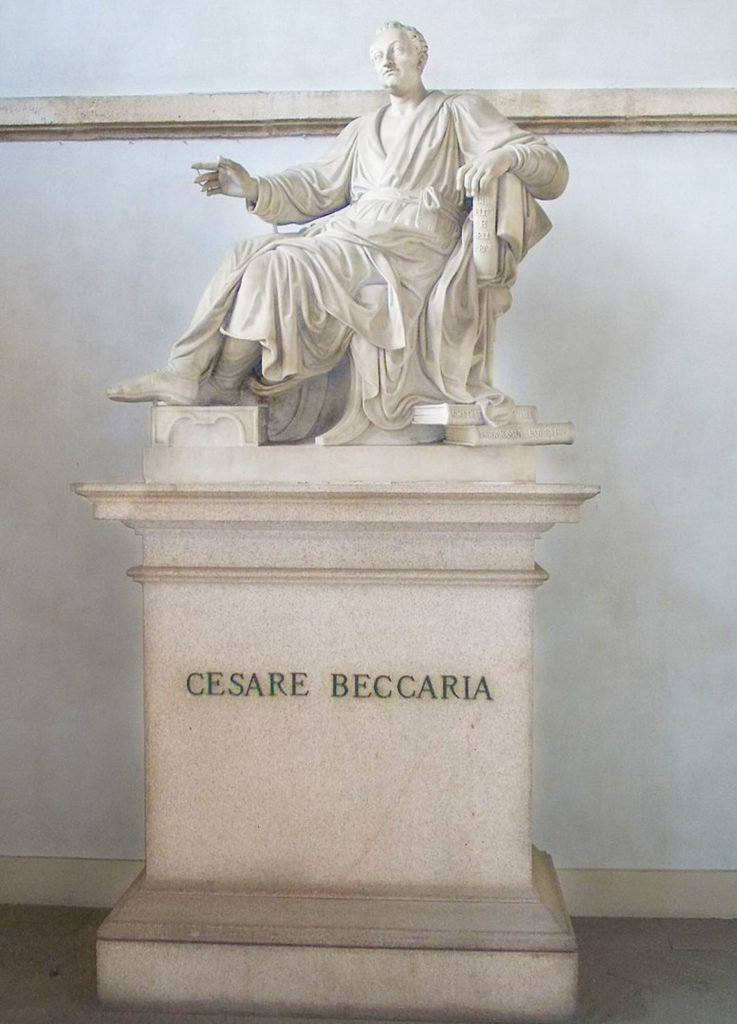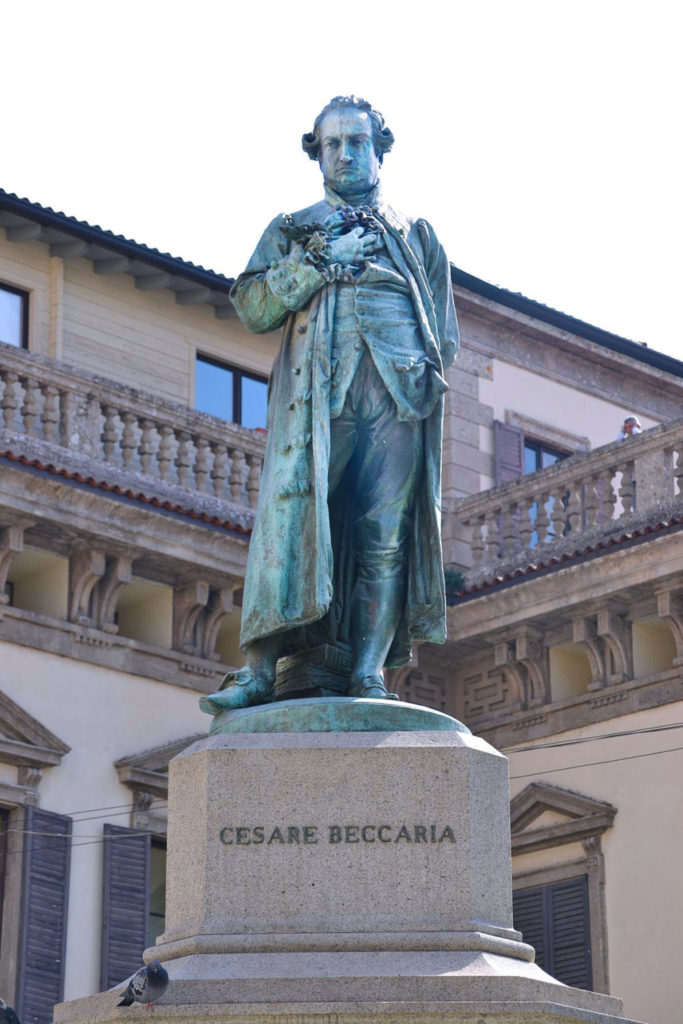Few Americans realize how influential an Italian author was by inspiring the Founding Fathers and promoting concepts that became part of the Declaration of Independence and the U.S. Constitution. The author’s name was Cesare Beccaria. He was born in Milan in 1738, into a moderate level of the aristocracy. His father was Marchese Gian Beccaria Bonesana and his son was heir to become the Marchese or Marquis of Gualdrasco and Villareggio. Cesare received his early education in the Jesuit College at Parma. Subsequently, he graduated in law from the University of Pavia in 1758. He was a criminologist, jurist, philosopher and politician. In addition to his profound writings, he was also a brilliant mathematician, influential economist and is universally considered to be one of the greatest thinkers of the Age of Enlightenment.
Notoriously shy, a condition that today would be termed generalized anxiety disorder, Breccaria, was highly principled. He wed in 1761 against his father’s wishes. He and his wife, Teresa Blasco, lived in poverty for nearly a year until his father, the Marchese, relented. That same year he founded a literary society among the Milanese nobility with his close friend Count Pietro Verri. It was humorously named “L’Accademia dei pugni,” the Academy of Fists. The name was chosen to poke fun at the stuffy academicians of the day. Irrespective of the group’s name, Verri and Beccaria’s writings were taken very seriously. Verri was to become one of the most influential economic philosophers of his day and Beccaria’s concepts are still followed more than 250 years later.
Beccaria's Written WOrks
The following year, Beccaria published his first work, a pamphlet on monetary reform, but his most significant contribution was to come three years later in 1764 with his treatise, “Delitti e Delle Pene,” On Crimes and Punishments. Almost immediately, Beccaria, then only 26 years of age, became an international celebrity. The work enjoyed remarkable success and was soon translated into six languages. It was the first full-length Italian book to be translated and published in the American Colonies. His treatise was the first succinct and systematic statement of principles governing criminal punishment. Therein Beccaria laid the foundation for the future United States’ concept of ‘life, liberty and the pursuit of happiness.’ He is now considered the father of both modern criminal law and criminal justice. One of the first people to quote directly from Beccaria’s book outside Europe was John Adams, who influenced the course of events of this country as one of its greatest constitutional lawyers and its second president. When Adams first quoted directly from Beccaria, it was said to have an electrifying effect on the jury. Thomas Jefferson read Crimes and Punishments intently. Passages were found in his diary and were later used in the Declaration of Causes in 1775, the Declaration of Independence the following year, the Constitution of 1778 and the Bill of Rights. Some quotes from Beccaria include, “Every act of authority, of one man over another for which there is not an absolute necessity, is tyrannical.” Another important contribution was, “No man can be judged a criminal until he be found guilty; nor can society take from the public protection, until it has been proved that he has violated the conditions on which it was granted.”
His writings formed the basis of the Second Amendment to the Constitution, where Beccaria argued against gun control laws, describing the laws as based on false ideas of utility. Beccaria wrote, “The laws of this nature are those which forbid to wear arms, disarming those only who are not disposed to commit the crime which the laws mean to prevent.”

Also revolutionary was Beccaria’s proposal that rather than an eye for and eye, the purpose of punishment is to create a better society, rather than for revenge. In his view, punishment should serve to deter others from committing crimes and to prevent the criminal from repeating the crime. He also argued that laws should be clear in defining crimes so that judges would not need to interpret the law, but only decide upon whether a law had been broken. Legal scholars of the time hailed Beccaria’s treatise and several European emperors vowed to follow it. Many reforms in the penal codes of the principal European nations can be traced to the treatise.
The Invention of the Thermometer
Although his subsequent writings did not have the enormous impact that his treatise did, his career was highly significant. In retrospect, it might have been more so had it not been for his reluctance and fear of public speaking. Nevertheless, in November 1768, the Palatine College of Milan created the Chair of Law and Economy expressly for Beccaria. Three years later, he was made a member of Milan’s Supreme Economic Council and remained a public official for the remainder of his life. In his public role, Beccaria championed issues of monetary reform, labor relations and public education. A report written by him influenced the later adoption of the metric system in numerous European countries. He was troubled with health problems in his later years and died in Milan in 1794 at the age of 56.






